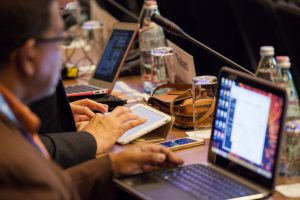Many developing countries are confronted by many challenges. When it comes to information access the obvious challenges are limited access, low literacy rate, lack of media competence to use Information and Communication Technologies(ICT) for data and information access. Newer, ICT offers immense opportunities towards formulation and implementations of socially inclusive economic growth. Although the development of ICT infrastructure and implementation are promising, many challenges still need to be addressed. Significant challenges, for example, are funding and policy advice, access to information and data. Data and information access support inclusive green growth by providing low-income people with access to basic information for basic goods, services, and choices. Inclusive businesses are an initiative that actively incorporates low-income groups into the company’s core processes, creating value for both the business and low-income group (MDF training & Consultancy 2016). In addition, Inclusive businesses are also often associated with “green” business practices that conserve resource and protect the environment.

Several prominent examples in sub-Saharan Africa demonstrate not only that this paradigm shift is possible, but that can be profitable and beneficial for a wide range of stakeholders.
Information and data access directly support socially inclusive economic growth by provides business with the awareness, knowledge, technology, and know-how required to operate in low-income markets. Acquiring reliable information, a foundational element in starting and operation any business can be a significant challenge for organizations working with low-income communities.
The economic land scape in many parts of sub-Saharan Africa is changing quickly for the better. GDP growth for the African continent as a whole is expected to reach 5.4% in 2015-2017. For example, Ethiopia is marking the fastest growth in the world with 8.4% in 2016 (Worldbank, 2017). Nevertheless, when it comes to socially inclusive economic growth still a long way to go faced with different challenges and benefits are unequally distributed. This indicates how developing countries like Ethiopia are affected by lack of socially inclusive economic growth and unequal distribution of benefits which hinder the overall growth and development. However, identifying gaps in the socially inclusive growth to work narrowing the gap is vital to overcoming such inequalities.
Inclusive businesses operate in a challenging environment. Low-income markets lack many conditions that enable function markets, as the GIM research in 2008 reconfirmed. Reliable market information is often absent. To combat this situation appropriate ICT are demanded and required to leverage for socially inclusive economic growth. Countries like Ethiopia can mitigate many of challenges by integrating ICT into their socially inclusive growth models.
According to the International Telecommunication Union ICT have enormous potential to fast forward progress on the SDGs and improve people’s lives in fundamental ways. Making modern ICTs more widely available will foster the local innovation needed to spur domestic economic growth, provide decent work and reduce inequalities.
A socially inclusive economic growth is made up of a network of interconnected, inter-depend government, civil society, development partners, the private sector and other players, whose action help the socially inclusive business succeed, generate impact and go to a large scale. In this case how better theses players help to leverage from ICT for more socially inclusive economic growth.
Ethiopia is undertaking a massive ICT infrastructure development which could bring benefit for socially inclusive economic growth. Recently, for example, the high expansion and prevalence of mobile phone subscribers, 30 million (ethio telecom, 2016), coupled with growing ICT sector, provides opportunity with a new medium to better reach low-income consumers and producers in Ethiopia. Therefore, they can leverage mobile technologies in order to pursue improved market research, innovative pricing, and payment system, expand marketing and deepen consumer relations and transform sales and delivery channels. Eventually, this information’s access makes an important contribution to the increased revenue; reduce costs, improved business functions and more inclusive product and service innovations in the country by supporting socially inclusive economic growth.
In the other hand ICT facilitating up-to-date data and information access for socially inclusive economic growth policy development, planning and coordination within different stakeholders through the provision of relevant and reliable data, experiences and best practices.

Dawit Dagnew
Knowledge Management & Communication Advisor Energising Development (EnDev) Ethiopia.
Energising Development (EnDev) Ethiopia.
